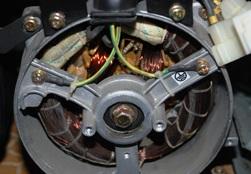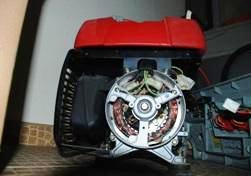Categories: Sharing experience, Autonomous power supply
Number of views: 39124
Comments on the article: 5
What to consider when choosing a generator
 Any sane person, before making any serious purchase, must determine the basic criteria that this product must meet. For example, when purchasing a refrigerator, you decide whether you need a freezer in it or not, the internal volume of the refrigerator, etc. The same goes for mini power plants for the home.
Any sane person, before making any serious purchase, must determine the basic criteria that this product must meet. For example, when purchasing a refrigerator, you decide whether you need a freezer in it or not, the internal volume of the refrigerator, etc. The same goes for mini power plants for the home.
In this short article, we will consider the main points that you need to pay special attention to when choosing a generator.
1) Power of the generator;
2) The total load power;
3) Type of load;
4) Number of phases;
5) Fuel on which the generator will work;
Generator power
So, the first thing you should pay attention to is, of course, the power of the generator. Not only the final cost of the generator set, but also the reliability of the entire power system of the house depends on how correctly and correctly you calculate the necessary load in the house, powered by a generator.
When calculating the total power of consumers, it is necessary to take into account such an important point as the starting currents of electrical appliances. For example, at the time of start-up, a refrigerator or hydrophore (a pump for pumping water) consumes 3-6 times more energy than in standard operation.
Do not forget that the generator is not the main source of electricity and only the most necessary electrical appliances are connected to it.
If the electrical wiring in the house allows, then ideally it would be possible to distinguish the most important groups - heating, refrigerators, lighting, fire alarm, gates, etc. As a rule, a generator with a capacity of 5-6 kW is enough for a medium-sized house.
Overview of the generators in the video:
Single phase or three phase?
 Quite an important point when choosing a generator. Now many homeowners bring a three-phase network to the house, although the house, as a rule, does not have three-phase loads. And then the reasonable question arises, which generator to purchase - single-phase or three-phase?
Quite an important point when choosing a generator. Now many homeowners bring a three-phase network to the house, although the house, as a rule, does not have three-phase loads. And then the reasonable question arises, which generator to purchase - single-phase or three-phase?
Many, after consulting with their electricians, decide to purchase three phase generator, mistakenly relying on the fact that all the wiring in the house is designed for a three-phase network and the load is evenly distributed over three phases, respectively, and the generator should be three-phase, forgetting about such an important moment as phase imbalance, to which the generators are so sensitive. The maximum allowable skew of 20-25%.
For example, take a 6 kW generator. In the case of a three-phase generator, these same 6 kW are evenly divided into 3 phases, that is, 2 kW can be loaded on each of the phases of the generator, not forgetting the phase imbalance. In the case of single phase generator, everything is much simpler, there is no need to control the load, within the permissible 6 kW.
Conclusion: in the absence of a three-phase load, we recommend that you purchase a single-phase generator. Switching from three phases into one is carried out in the shield itself and does not require interference with the existing wiring of the house.
Gasoline, diesel or gas?
Choosing a generator, many do not know which generator to prefer - diesel, gasoline or gas. Each of these generators has its pros and cons.
Diesel generator. More economical, but 20-30% more expensive than gasoline. The resource of a diesel generator is 1.5-2 times more than gasoline. When operating diesel generators, one should not forget that the generator must not be “driven” idle, it must be “loaded” with at least 30-40% of their power, otherwise the engine life will be significantly reduced. With gasoline generators in this regard, it is easier to carry any load.
Gasoline generators. Easy to operate, but quite sensitive to fuel quality.
Gas generators. The most optimal solution for home. Structurally, this is the same gasoline generator, but the engine resource is 1.5-2 times longer compared to a gasoline generator. In terms of operation, it is more convenient than gasoline and diesel generators in that if connected to natural gas, there is no need to control the availability of fuel. And, in addition, the cost of electricity generated is up to 10 times cheaper than gasoline and diesel generators.
If you are at a loss with the choice of a generator, contact a specialized company, invite specialists. Trust the professionals, and you will be happy;).
Sergey Seromashenko
See also at e.imadeself.com
:
